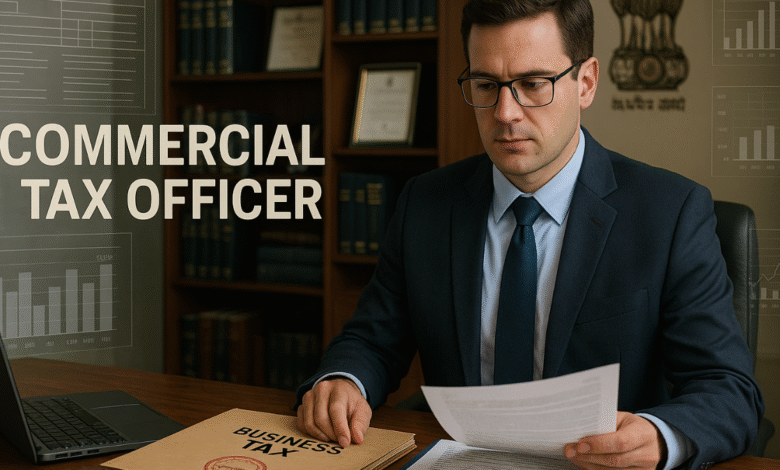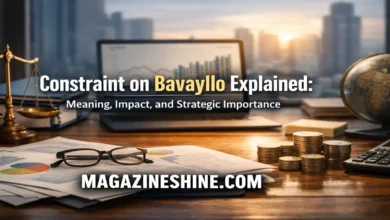Commercial Tax Officer: Duties, Eligibility, Salary, and Career Growth Explained

Learn all about the role of a Commercial Tax Officer—duties, eligibility, salary, challenges, and career growth. Discover why this position is vital for tax compliance.
The role of a commercial tax officer is one of the most crucial positions in the tax administration system of any country. This designation represents authority, responsibility, and expertise in handling the complex network of tax regulations that govern trade, commerce, and business activities. A commercial tax officer is often seen as the connecting link between the government and the business community, ensuring compliance with tax laws while facilitating smooth revenue collection for the state.
In this article, we will break down every aspect of the commercial tax officer’s role—from eligibility and duties to challenges and career prospects. Whether you’re a student aspiring to join government service, a professional interested in taxation, or simply a curious reader, this detailed guide provides everything you need to know about the position.
Understanding the Role of a Commercial Tax Officer
The position of a commercial tax officer is rooted in the framework of state and central taxation systems. In simple terms, this officer is responsible for assessing, collecting, and monitoring taxes on commercial activities. These taxes may include sales tax, value-added tax (VAT), goods and services tax (GST), and other forms of revenue collected from business transactions.
A commercial tax officer doesn’t just enforce laws but also acts as an advisor to businesses by helping them understand their tax liabilities. In many cases, the officer interacts directly with entrepreneurs, accountants, and auditors to resolve disputes or clarify regulations. Because taxation is such a sensitive area of business, the officer’s work requires a balance of firmness, fairness, and expertise.
Moreover, this role is considered highly prestigious in the administrative hierarchy. It comes with both responsibility and respect, as commercial tax officers are the guardians of one of the state’s primary sources of income.
Duties and Responsibilities
The everyday duties of a commercial tax officer are diverse and multifaceted. On one hand, they involve legal and administrative tasks; on the other, they require people management skills.
- Tax Collection and Monitoring
The officer ensures that businesses deposit taxes on time and in accordance with government regulations. This involves maintaining detailed records of tax payments, identifying defaulters, and initiating legal action if necessary. - Assessment of Tax Liability
Businesses often underreport or misinterpret their tax obligations. A commercial tax officer conducts audits and inspections to determine the correct amount owed. - Implementation of Government Policies
Whenever new tax reforms or amendments are introduced, the officer plays a vital role in implementing them effectively. This includes educating business owners, updating records, and ensuring compliance. - Dispute Resolution
Not every tax case is straightforward. Commercial tax officers often handle appeals, resolve disputes, and provide clarifications to minimize conflicts between the government and taxpayers. - Preventing Tax Evasion
Identifying fraudulent activities, conducting surprise inspections, and investigating suspicious financial transactions are critical parts of the role.
Through these responsibilities, the officer ensures that the financial backbone of the state remains strong and transparent.
Qualifications and Eligibility
To become a commercial tax officer, candidates usually go through competitive government examinations. While the requirements may differ depending on the country or state, certain criteria are common across systems:
- Educational Background: A bachelor’s degree is the minimum requirement, usually in commerce, law, economics, or business administration. Candidates with professional qualifications such as CA, CS, or MBA often have an advantage.
- Examinations: Aspirants must clear state or central public service commission exams, where subjects such as taxation, accounting, law, and general studies are tested.
- Skills Required: Strong analytical ability, communication skills, knowledge of finance, and a keen sense of fairness are vital for success.
- Age Limit and Nationality: Each state or country has its specific rules regarding the minimum and maximum age for applicants and citizenship requirements.
Training and Career Path
Once selected, candidates undergo rigorous training that includes both classroom learning and fieldwork. The training emphasizes taxation laws, auditing procedures, public administration, and ethical practices. Officers are posted across districts, towns, or commercial hubs where they gain practical exposure.
The career path of a commercial tax officer often extends to higher positions such as Assistant Commissioner, Deputy Commissioner, Joint Commissioner, and Commissioner of Commercial Taxes. With seniority, officers take on policy-making roles, supervise large teams, and contribute to shaping tax reforms.
Challenges Faced by Commercial Tax Officers
Being a commercial tax officer is not without its challenges. Some of the common issues include:
- Tax Evasion: Despite strict laws, businesses may attempt to underreport sales or hide income. Identifying and addressing such malpractices is a constant battle.
- Complex Laws: Taxation is ever-changing. Officers must stay updated with amendments, judicial rulings, and government notifications.
- Pressure from Stakeholders: Balancing government expectations with public grievances requires diplomacy and resilience.
- Workload and Stress: With tight deadlines and extensive paperwork, officers often work long hours under pressure.
However, for those passionate about law, governance, and finance, these challenges only add to the excitement and satisfaction of the job.
Salary and Benefits
The position of a commercial tax officer is considered both financially rewarding and secure. Salaries vary across states or countries but typically include:
| Component | Details |
|---|---|
| Basic Pay | Determined by government pay commission scales |
| Allowances | House rent allowance (HRA), dearness allowance (DA), travel allowance |
| Perks | Medical facilities, pension, job security, and government housing |
| Promotions and Increments | Regular increments and promotions based on seniority and performance |
In addition to monetary benefits, the position carries prestige, authority, and opportunities for career advancement.
Importance of Commercial Tax Officers in the Economy
Commercial tax officers form the backbone of public finance. Their role is not just about collecting money but also about maintaining economic balance. Here’s why they are indispensable:
- Revenue Generation: Taxes are the lifeblood of government programs, infrastructure projects, and social welfare schemes. Officers ensure steady inflow of funds.
- Encouraging Compliance: Through education and enforcement, officers instill a culture of voluntary compliance among businesses.
- Economic Regulation: By monitoring trade and commerce, they help curb illegal practices and create a level playing field.
- Policy Feedback: Officers provide ground-level insights to policymakers, which shape future reforms.
FAQs about Commercial Tax Officers
Q1. What is the role of a commercial tax officer in GST?
A commercial tax officer ensures businesses register under GST, file accurate returns, and pay the correct tax. They also handle audits and inspections under the GST framework.
Q2. How can I become a commercial tax officer?
You need to qualify for state or central public service commission exams, meet eligibility criteria, and undergo training after selection.
Q3. What skills are most important for this job?
Strong analytical skills, communication, financial knowledge, decision-making ability, and integrity are essential.
Q4. Do commercial tax officers have field duties?
Yes, they often conduct inspections, verify records at business premises, and investigate cases of suspected tax evasion.
Q5. What is the career progression like?
From commercial tax officer, one can advance to Assistant Commissioner, Deputy Commissioner, and eventually Commissioner of Commercial Taxes.
Conclusion
The position of a commercial tax officer combines authority, responsibility, and the satisfaction of serving the nation’s economic interests. It is a career path that demands dedication, fairness, and constant learning. By ensuring businesses follow tax laws, officers play a pivotal role in building the financial health of the country. For aspirants, the journey to becoming a commercial tax officer may be competitive and challenging, but the rewards—both professional and personal—make it worth every effort.





